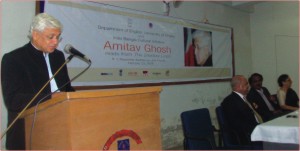Feature
Departmnet Of English &Indo-Bangla Cultural Initiative:
Amitav Ghosh reads from “The Shadow Lines”
Zannatul Lamea
 "FOR my grandmother, time was like a toothbrush : it went mouldy if it wasn't used. I asked her once what happened to waste time. She tossed her small silvery head, screwed up her long nose and said : It begins to stink. As for herself, she had been careful to rid our little flat of everything that might encourage us to let our time stink...” read on Amitav Ghosh from his novel “The Shadow Lines” at R.C.Majumder auditorium, Dhaka University on February 23, 2008. Department of English, Dhaka University and Indo-Bangla cultural initiative along with Indian High Commission, Words and Pages, The Westin and HSBC Bank as media partners jointly arranged the event “Amitav Ghosh reads from : The Shadow Lines..” The novel focuses on the narrator's family in Calcutta and Dhaka and their connection with an English family in London. From Dhaka to London, this novel contains a wealth of characters and colour. "FOR my grandmother, time was like a toothbrush : it went mouldy if it wasn't used. I asked her once what happened to waste time. She tossed her small silvery head, screwed up her long nose and said : It begins to stink. As for herself, she had been careful to rid our little flat of everything that might encourage us to let our time stink...” read on Amitav Ghosh from his novel “The Shadow Lines” at R.C.Majumder auditorium, Dhaka University on February 23, 2008. Department of English, Dhaka University and Indo-Bangla cultural initiative along with Indian High Commission, Words and Pages, The Westin and HSBC Bank as media partners jointly arranged the event “Amitav Ghosh reads from : The Shadow Lines..” The novel focuses on the narrator's family in Calcutta and Dhaka and their connection with an English family in London. From Dhaka to London, this novel contains a wealth of characters and colour.
Amitav Ghosh, the popular Indian-Bengali author and literary critic, was awarded the Padmashri by the Indian government in 2007. Popularly known for his work in English language he doesn't need an introduction. Weaving Indo-nostalgic constituents into more serious themes and sometimes characterized by post-colonialism, he thus creates his unique style of fiction-writing. His second novel- The Shadow Lines won the Sahitya Akademi Award, India's most prestigious literary award. The Calcutta Chromosome was another book by him that won the Arthur C. Clarke Award for 1997. Other prominent books by Amitav Ghosh include : The Hungry Tide (April 2004), In an Antique Land (1992), Dancing in Cambodia, At Large in Burma (1998), Countdown (1999), The Imam and the Indian(2002),The Circle of Reason (1986), The Shadow Lines (1990), The Calcutta Chromosome (1995) and The Glass Palace (2000).
With all the seats of R.C. Majumder auditorium filled with eager students and teachers, the programme began at 10 AM sharp. It was presided over by Prof. Niaz Zaman, Faculty, Department of English, Dhaka University. Amitav Ghosh upon his arrival was greeted with flower bonquets by students and with a roar of applause from the audience. Recollecting his writing profession, Amitav Ghosh mentioned “ In those days, writers were role models for us. Personally speaking, I had always been a book-worm and this somehow triggered the passion of writing in me. The sense of writing basically comes from reading, its simple - people should write what they read and think while reading..”
Claiming himself as an “Accidental Anthropologist,” Amitav Ghosh made the crowd burst out with laughter. “ Actually I loved to travel. And travelling, back in our days was commonly conducted due to academic purpose only. I enrolled myself in anthropology to get an accommodation at the hostel and that's how I became an anthropologist! But then again, in retrospect, I feel great that I studied it, because the understanding did help me with my writing.”
During the question and answer session, he said , “I am not actually very much drawn to urban life. I feel more tuned towards the marginal aspects, the rural life-style of Indian culture and sub-cultures. Silent moments of history inspire me, not the great milestones. And sometimes it is necessary for a writer to address social and political issues too. So, I try to relate facts with fictions, with a tinge of personal and nostalgic experiences as well.”
Prof. Niaz Zaman concluded the event with her closing speech, thanking all those connected with successful organization and staging of this event.
(Writer is a student of North South University)
|
